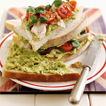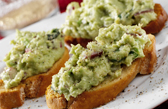
Recipes - Lunch
Olympic ‘Avocado’ Sandwich Created by Jane Griffin (BSc RD SENr), Sports Dietician and Nutrition Consultant
Ingredients
8 x Slices white bread
2 x Peruvian Hass Avocados, halved, peeled, and stone removed (a thick layer instead of butter or margarine)
1 x Large chicken breast
12 x Cherry tomatoes, cut in half
8 x Black olives, stones removed, cut in half
Small handful walnut pieces (optional)
Handful watercress
Drizzle classic vinaigrette dressing with crushed garlic
Serves
4
Preparation Time
10 minutes
![]()
Method
- Mash the avocado, in a bowl using the back of a fork, until it reaches a spreadable consistency, but remains slightly chunky. Then spread a layer of avocado onto one side of each slice of bread
- Slice or shred the chicken and place on top, followed by the cherry tomatoes, olives, walnuts and watercress
- Lastly, drizzle each sandwich with a little dressing and top with the remaining slices of bread
Ingredients Attributes:
White bread:
Good source of complex carbohydrates for energy. Contains calcium, essential for strong and healthy bones (and teeth), important in blood clotting and essential for nerve and muscle function. Good source of several B vitamins, many of which are involved in the release of energy from carbohydrate.
Hass Avocado:
Good source of vitamin C (for healthy skin, blood vessels, gums, teeth, wound healing, iron absorption and formation of antibodies, an important antioxidant), vitamin E (powerful antioxidant) and B6 (needed for protein metabolism, the function of the central nervous system, haemoglobin production and antibody formation).
Good source of the mineral potassium (important in the regulation of fluid balance in conjunction with sodium; appears to have a positive effect in reducing blood pressure (a reason to maintain fruit and vegetable intakes); is involved in nerve and muscle function. Contains useful amounts of iron (iron is part of haemoglobin in red blood cells that carries oxygen to all parts of the body). Also contains useful amounts of magnesium (main functions in the body are energy production, nerve and muscle function and bone structure). Contains useful amounts of the folic acid, a vitamin important in red and white blood cell formation in bone marrow.
Fat in avocado is mostly unsaturated and therefore doesn’t increase blood cholesterol levels (unlike saturated fat).
A tablespoon of avocado contains approx.. 40kcals compared to a tablespoon of butter or margarine which contains approx. 100kcals.
Chicken:
Skin removed to reduce the fat content (and looks better too). 100g roast chicken (no skin) only contains 3.6g fat and is lower in saturated fat than red meat. Excellent source of high quality protein – 30g in 100g roast chicken breast (no skin). Good source of B vitamins: 100g chicken provides almost all the daily requirement for niacin and more than half the daily requirement for vitamin B6. Chicken is also a good source of several essential minerals including copper, iron, phosphorus, potassium and zinc which between them perform a wide range of functions in the body.
Tomatoes:
These provide a useful source of vitamin C, E and ß carotene (the precursor of vitamin A), folate and the mineral potassium. Tomatoes are also a good source of lycopene – an antioxidant. A medium ripe tomato will provide 15kcals, 14 mg vitamin C and 19µg folate. The jelly-like substance round the tomato seeds is high in salicylates which have an anti-clotting effect on blood and therefore possibly may provide some protection against heart disease.
Watercress:
This vegetable (though not often eaten in particularly large amounts) is an excellent source of ß carotene and vitamin C. It also provides some vitamin E too. It is a useful source of the minerals calcium, iron and potassium and rich in antioxidants, bioflavonoids and other substances that may protect against certain types of cancer.
Olives:
High in monounsaturated fats and low in saturated fats which helps in raising the beneficial HDL cholesterol in the blood. High consumption of olives and olive oil are thought to be one of the reasons why Mediterranean countries have a low incidence of heart disease.
High in vitamin E, a powerful antioxidant which helps to protect the body tissues against free radical damage. Such damage to tissues may eventually cause heart disease and some cancers. The advice to eat at least five portions of fruit and vegetables every day is partly because of the strong evidence that these food are such powerful antioxidants.
Walnuts:
Rich source of fibre, vitamin E, omega 3 fatty acids - all important nutrients in maintaining heart health. Omega 3 fatty acids can also reduce tenderness in joints and reduce the stiffness in joints first thing in the morning in people who suffer from osteo-arthritis.
Garlic:
Used for thousands of years (Ancient Egyptians and Ancient Greeks). May help to reduce high blood pressure and elevated blood cholesterol (though those on medication should not stop taking their pills, just include garlic in their diet on a regular basis). May help prevent and fight infections.
Oil in dressing:
The oil helps the body absorb some of the carotenoids (precursors of vitamin A) found in the tomatoes and watercress. Vitamin A is essential for healthy skin, protects against poor vision in dim light and has antioxidant properties.
Vinegar:
Almost no calorie value, acts as a preservative
Quote:
"The ingredients in the Olympic Sandwich provide a range of nutrients which we all need but which certainly fit extremely well in the diet of a sportsperson - although the size of the sandwich might vary quite a lot! There is carbohydrate for energy, protein for muscles and a range of minerals and
And/or
“Avocados contain a range of essential vitamins and minerals vital for sporty people (and non-sporty people too) and using avocados instead of your usual fat spread could save you calories and even more good news - the fat in avocados is mostly unsaturated which doesn't play a part in raising blood cholesterol levels.”
Nutritional Analysis:
|
|||||||||||||||||||||||||||||||||||||||||||||||||
|


















